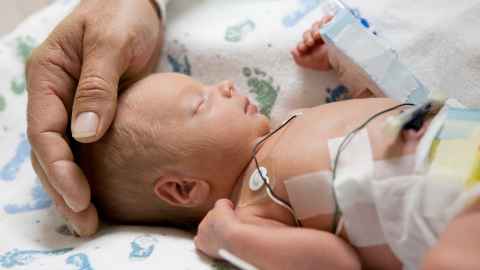High blood pressure risk for women born early
3 July 2019
Born prematurely? Here’s another reason to look after your health: you may have a higher risk of developing high blood pressure.

A new study led by the Liggins Institute has found that 18-year-old women born preterm (before 37 weeks of gestation) are almost twice as likely to have high blood pressure, even at this young age, as those born at term.
About 15 million babies are born prematurely every year worldwide, more than one in 10 of all babies. In Aotearoa New Zealand, 4,500 babies were born preterm in 2017 (latest figures), around one in 13 of all babies. Preterm birth is linked to serious health problems following birth and, scientists are increasingly realising, into adulthood.
High blood pressure, or hypertension, can silently damage your body for years before any obvious symptoms appear. Over time, it can lead to heart disease and stroke, which are the world’s biggest killers.
“There is now overwhelming evidence showing that preterm birth is a risk factor for cardiovascular disease and metabolic diseases such as diabetes and obesity, later in life,” says study lead Dr José Derraik, a senior research fellow at the University of Auckland-based Liggins Institute.
The study, published in the Journal of the American Heart Association, is the latest in a series by researchers from the Institute and Sweden’s Uppsala University, which is helping us understand the far-reaching reverberations of events and exposures occurring before, during and after pregnancy.
Being at risk for something doesn’t necessarily mean you’ll get it. As with many
conditions, we can offset known risks with a healthy diet, regular exercise, and regular, adequate sleep.
Researchers examined health records from 5232 young Swedish women who volunteered for military service in Sweden between 1990 and 2007. The records came from the Swedish Conscript Register.
On average, those women born preterm had higher systolic blood pressure compared to women born at term (systolic pressure is the top number in a blood pressure reading, and refers to the amount of pressure in the arteries during the contraction of the heart muscle). They were also 1.7 times more likely to have high blood pressure.
An earlier Swedish study found the same pattern for young men, but the differences were less marked.
An editorial accompanying this latest New Zealand-Sweden study suggested it may be time to apply the concept of ‘precision medicine’ to people born preterm. This could involve extra monitoring and potentially earlier use of hypertension drugs to nip blood pressure rise in the bud.
No need to panic if you were born preterm, though, says Dr Derraik. “Being at risk for something doesn’t necessarily mean you’ll get it. As with many conditions, we can offset known risks with a healthy diet, regular exercise, and regular, adequate sleep."
Says co-researcher and Liggins Institute Professor Cutfield, who is also Director of A Better Start National Science Challenge: "Health professionals can help people born preterm to stay well by supporting them to make healthier lifestyle choices, while keeping a closer eye on their blood pressure from adolescence.”
The study’s other authors were Loren Skudder-Hill, a New Zealand undergraduate student at Jiangsu University in China; and Associate Professors Fredrik Ahlsson and Maria Lundgren at Uppsala University, Sweden.
Read the article:
Journal of the American Heart Foundation: Preterm Birth is Associated With Increased Blood Pressure in Young Adult Women
Media contact
Nicola Shepheard | Media Adviser
Tel: +64 9 923 1515
Mob: +64 27 537 1919
Email: n.shepheard@auckland.ac.nz